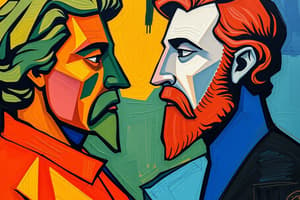Podcast
Questions and Answers
Classical liberalism emerged during the Age of Exploration.
Classical liberalism emerged during the Age of Exploration.
False (B)
John Locke and Adam Smith were influential philosophers in the development of classical liberalism.
John Locke and Adam Smith were influential philosophers in the development of classical liberalism.
True (A)
Classical liberalism advocated for maximum government intervention in economic affairs.
Classical liberalism advocated for maximum government intervention in economic affairs.
False (B)
The principles of classical liberalism promoted restrictions on individual freedom and rights.
The principles of classical liberalism promoted restrictions on individual freedom and rights.
One of the economic principles of classical liberalism was advocacy for controlled markets.
One of the economic principles of classical liberalism was advocacy for controlled markets.
Classical liberalism influenced modern politics by emphasizing limits on government power.
Classical liberalism influenced modern politics by emphasizing limits on government power.
Classical liberalism emphasizes the importance of collective action over individual rights.
Classical liberalism emphasizes the importance of collective action over individual rights.
Adam Smith's work 'The Wealth of Nations' supported the idea that competition among producers benefits consumers.
Adam Smith's work 'The Wealth of Nations' supported the idea that competition among producers benefits consumers.
Property rights were not considered essential in classical liberal economic thought.
Property rights were not considered essential in classical liberal economic thought.
Civil liberties are a key aspect of classical liberal political theory.
Civil liberties are a key aspect of classical liberal political theory.
Classical liberalism has had no impact on the relationship between the state and society.
Classical liberalism has had no impact on the relationship between the state and society.
Critics of classical liberalism argue that it prioritizes environmental sustainability and public health concerns.
Critics of classical liberalism argue that it prioritizes environmental sustainability and public health concerns.
Study Notes
Classical Liberalism: A Historical Perspective on Modern Politics and Economy
Classical liberalism, also known as classical economics or laissez-faire economy, is a political ideology that emerged in Europe during the Age of Enlightenment. Rooted in the ideas of philosophers like John Locke, Immanuel Kant, and Adam Smith, classical liberalism sought to establish limits on government power and promote individual freedom and rights. Over time, these principles influenced the development of modern politics and economics, shaping the way societies approach issues such as property rights, free trade, and civil liberties.
Origins of Classical Liberalism
The roots of classical liberalism trace back to the 18th century, particularly in Enlightenment philosophy, which emphasized reason and individualism. Key figures of this era, such as John Locke and Immanuel Kant, posited ideas of natural rights, limited government, and individual liberty. These principles laid the groundwork for classical liberal thought, which sought to minimize government intervention in economic affairs and protect individual freedoms.
Economic Principles of Classical Liberalism
One of the most significant contributions of classical liberals was their advocacy for free markets and minimal government interference in economic activity. They believed that allowing individuals and businesses to pursue their self-interest would ultimately lead to prosperity for society as a whole. This laissez-faire economic philosophy was enshrined in Adam Smith's influential work, "The Wealth of Nations," which argued that competition among producers would create a more efficient market and benefit consumers.
A critical aspect of classical liberal economic thought was the concept of property rights, which held that personal ownership of resources was essential for fostering industry, innovation, and economic growth. This belief led to support for private property and the protection of intellectual property, both key components of modern capitalist societies. As a result, classical liberalism's emphasis on individual rights, limited government, and economic freedom has played a crucial role in shaping contemporary discussions around trade policies and business regulations.
Political Influence of Classical Liberalism
Far beyond economics, classical liberal political principles have shaped modern Western democracies, particularly in terms of civil liberties. Key aspects of classical liberal political theory include rule of law, separation of powers, and checks and balances—concepts that have become cornerstones of many democratic constitutions. For instance, the U.S. Bill of Rights and the UK's Bill of Rights have been influenced by the ideas of classical liberalism, ensuring protection for individual rights such as freedom of speech and religion.
Classical liberalism's emphasis on individual rights and limited government has also had a significant impact on the relationship between the state and society. It has led to the recognition of the importance of civil society, with individuals and organizations playing a crucial role in shaping public discourse and driving social change. Furthermore, this perspective has fostered a culture of sympathy and empathy towards marginalized groups, encouraging activism and advocacy efforts aimed at promoting equality and social justice.
Criticisms of Classical Liberalism
Despite its influential legacy, classical liberalism has faced numerous criticisms over time. Some critics argue that it ignores the importance of communitarian values and collective action, leading to disparities between different social classes and communities. Additionally, some contend that its focus on individual rights can overshadow broader societal needs, such as environmental sustainability or public health concerns.
These criticisms have given rise to alternative political ideologies that emphasize the importance of community and state involvement in addressing pressing issues. For example, social democracies prioritize collective welfare through a strong safety net and active state intervention in the economy, while communist regimes reject private property and advocate for collective ownership of the means of production. Despite these challenges, classical liberalism remains a powerful force in shaping political discourse and economic policy worldwide.
In conclusion, classical liberalism represents an enduring legacy from the Age of Enlightenment, with its principles continuing to influence modern politics and economics. From its origins in Enlightenment philosophy to its impact on economic theories like capitalism and democracy, classical liberalism has left an indelible mark on Western civilization. Its emphasis on individual rights, limited government, and free markets has shaped our understanding of society, commerce, and governance, shedding light on the complex interplay of power and responsibility in today's world.
Studying That Suits You
Use AI to generate personalized quizzes and flashcards to suit your learning preferences.
Description
Test your knowledge on the historical origins, economic principles, and political influence of classical liberalism. Explore key figures, concepts, and critiques related to this influential political ideology.




